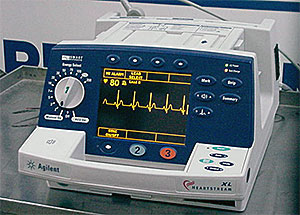NEWS
INDIETRODefibrillator for Pediatric Dialysis donated to Bambino Ges¨ Hospital in Rome

The Ginevra Caltagirone Foundation is pleased to have been able to donate a life-saving piece of equipment to the Bambino Gesù Children's Hospital in Rome. The Philips M4735A HEARTSTREAM XL, chosen based on a careful study conducted by the Biomedical Engineering Service, was considered to be the most suitable to meet the real needs of the Pediatric Dialysis Center.
A defibrillator is a device that makes it possible to treat the most frequent cause of cardiac arrest - ventricular fibrillation - by delivering an electric shock to the heart when necessary.
Defibrillation carried out within the first few minutes of cardiac arrest saves a life nine times out of ten. For this reason, the device is absolutely fundamental and the Dialysis Center simply cannot go without it.
The type of dysfunction affecting these patients involves the kidneys, which are the organs serving to cleanse the body.
In fact, it is estimated that about 1,500 liters of blood circulate through these organs every day.
In order to produce urine, the kidneys filter about a liter and a half of water out of 1,500 liters of blood, which is used to dissolve the waste to be eliminated. Urine is the means through which the body gets rid of poisons and acids.
When a disease begins to destroy the kidneys, the body slowly accumulates various substances that are damaging to the system itself. The most dangerous among these is potassium, because when it reaches certain levels it can trigger arrhythmias and cardiac arrest.
The Dialysis Center at Bambino Gesù Hospital performs hemodialysis treatments for acute and chronic cases and follows children treated through peritoneal dialysis.
The Dialysis Center is able provide urgent and highly specialized dialysis treatment and forms of continuous renal replacement therapy (CRRT), which are applied 24 hours a day. These methods are also used for children with serious cardiovascular issues, such as children who undergo major cardiac surgery, septic patients, and those affected by neonatal hyperammonemia.
Every
year, about 2,000 dialysis sessions are performed on chronic patients and treatment is provided for 10-15
children receiving peritoneal dialysis,
most of whom come in from other regions.

